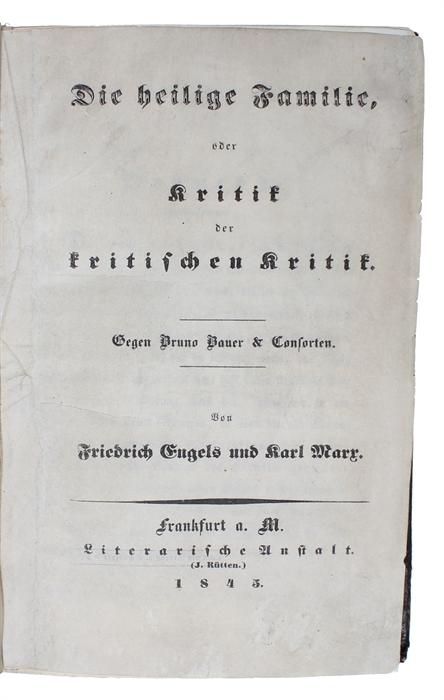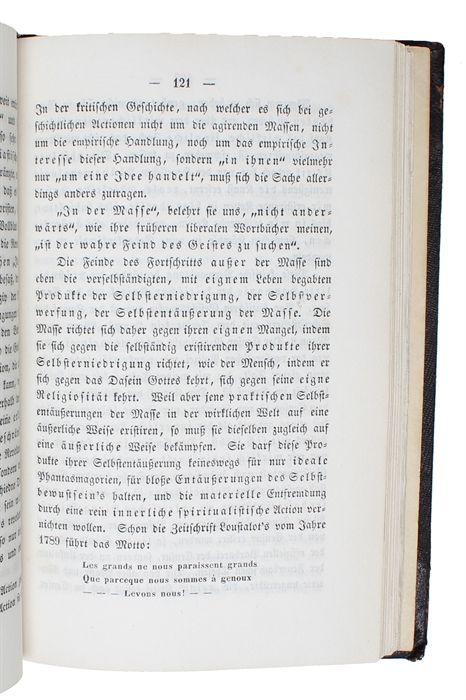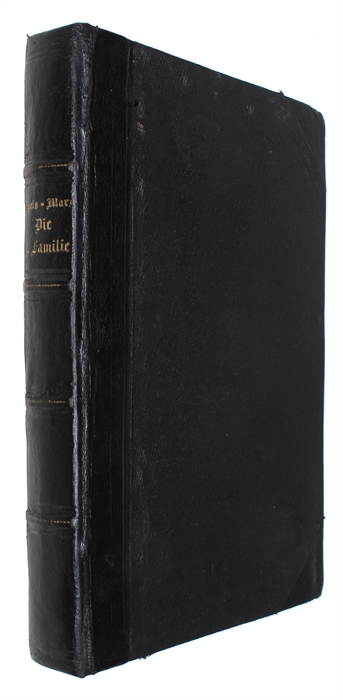THE COLLABORATION THAT WOULD CHANGE THE WORLD
ENGELS, FRIEDRICH & KARL MARX.
Die heilige Familie oder Kritik der kritischen Kritik. Gegen Bruno Bauer & Consorten.
Frankfurt a. M., 1845.
8vo. Contemporary black half calf. Professionally rebacked. Title-page somewhat dusty and re-hinged. VIII, 335, (1) pp.
Incredibly scarce first edition of one the most significant political publications of the 19th century, the first joint work of Marx and Engels, leading to a life-long association that would change the world.
"The Holy Family" is one of the most fundamental works in the history of communism and contains the first formulations of a number of fundamental theses of dialectical and historical materialism. For instance, it is here that the idea of mass/the people as the actual maker of the history of mankind is put forth for the first time and here that Marx shows that communism is the logical conclusion of materialistic philosophy.
The work became incredibly influential and caused great uproar. Lenin claimed that it was this work that laid the foundations for scientific revolutionary materialist socialism.
At the end of August, 1844, Engels passed through Paris,on his way to Manchester. It was here that he met Marx (then for the second time).
Marx suggested that the two of them should write a critique of Young Hegelian trend of thought then very popular in academic circles. They decided to co-author the foreword and divided up the other sections between them. Engels had already finished his chapters before leaving Paris after 10 days. Marx had the larger share of work, which he completed by the end of November 1844.
The general title, "The Holy Family", was added at the suggestion of the publisher Lowenthal, being a sarcastic reference to the Bauer brothers and their supporters.
" "The Holy Family, or Critique of Critical Critique. Against Bruno Bauer and Co." is the first joint work of Karl Marx and Frederick Engels. At the end of August 1844 Marx and Engels met in Paris and their meeting was the beginning of' their joint creative work in all fields of theoretical and practical revolutionary activity. By this time Marx and Engels had completed the transition from idealism to materialism and from revolutionary democratism to communism. The polemic The Holy Family was written in Paris in autumn 1844. It reflects the progress in the formation of Marx and Engels's revolutionary materialistic world outlook.
In "The Holy Family" Marx and Engels give a devastating criticism of the subjectivist views of the Young Hegelians from the position of militant materialists. They, also criticize Hegel's own idealistic philosophy: giving credit for the rational element in his dialectics, they criticize the mystic side of it.
The Holy Family formulates a number of fundamental theses of dialectical and historical materialism. In it Marx already approaches the basic idea of historical materialism - the decisive role of the mode of production in the development of society. Refuting the idealistic views of history which had dominated up to that time, Marx and Engels prove that of themselves progressive ideas can lead society only beyond the ideas of the old system and that "in order to carry out ideas men are needed who dispose of a certain practical force." (See p. 160 of the present edition.) The proposition put forward in the book that the mass, the people, is the real maker of the history of mankind is of paramount importance. Marx and Engels show that the wider and the more profound a change taking place in society is the more numerous Me mass effecting that change will Re Lenin especially stressed the importance of this thought and described it as one of the most profound and most important theses of historical materialism.
The Holy Family contains the almost mature view of the historic role of the proletariat as the class which, by virtue of its position in capitalism, "can and must free itself" and at the same time abolish all the inhuman conditions of life of bourgeois society, for "not in vain does" the proletariat "go through the stern but steeling school of labour. The question is not what this or that proletarian, or even the whole of the proletariat at the moment considers as its aim. The question is what the proletariat is, and what, consequent on that being, it will be compelled to do." (pp. 52-53.)
A section of great importance is "Critical Battle against French Materialism" in which Marx, briefly outlining the development of materialism in West-European philosophy, shows that communism is the logical conclusion of materialistic philosophy.
The Holy Family was written largely under the influence of the materialistic views of Ludwig Feuerbach, who was, responsible to a great extent for Marx's and Engels's transition from idealism to materialism; the work also contains elements of the criticism of Feuerbach's metaphysical and contemplative materialism given by Marx in spring 1845 in his Theses on Feuerbach. Engels later defined the place of The Holy Family in the history of Marxism when he wrote: "The cult of abstract man, which formed the kernel of Feuerbach's new religion, had to be replaced by the science of real men and of their historical development. This further development of Feuerbach's standpoint beyond Feuerbach was inaugurated by Marx in 1845 in The Holy Family." (F. Engels, Ludwig Feuerbach and the End of Classical German Philosophy.)
The Holy Family formulates some of the basic principles of Marxist political economy. In contrast to the Utopian Socialists Marx bases the objective inevitability of the victory of communism on the fact that private property in its economic motion drives itself towards its downfall.
The Holy Family dates from a period when the process of the formation of Marxism was not yet completed. This is reflected in the terminology used by Marx and Engels. Marxist scientific terminology was gradually elaborated and defined by Marx and Engels as the formation and development of their teaching progressed." (Introduction to the work by Foreign Languages Publishers)
"The book made something of a splash in the newspapers. One paper noted, that it expressed socialist views since it criticised the "inadequacy of any half-measures directed at eliminating the social ailments of our time." The conservative press immediately recognized the radical elements inherent in its many arguments. One paper wrote that, in The Holy Family, "every line preaches revolt... against the state, the church, the family, legality, religion and property." It also noted that "prominence is given to the most radical and the most open communism, and this is all the more dangerous as Mr. Marx cannot be denied either extremely broad knowledge or the ability to make use of the polemical arsenal of Hegel's logic, what is customarily called 'iron logic.'
Lenin would later claim this work laid the foundations for what would develop into a scientific revolutionary materialist socialism." (Marx Archive).
Order-nr.: 58581



